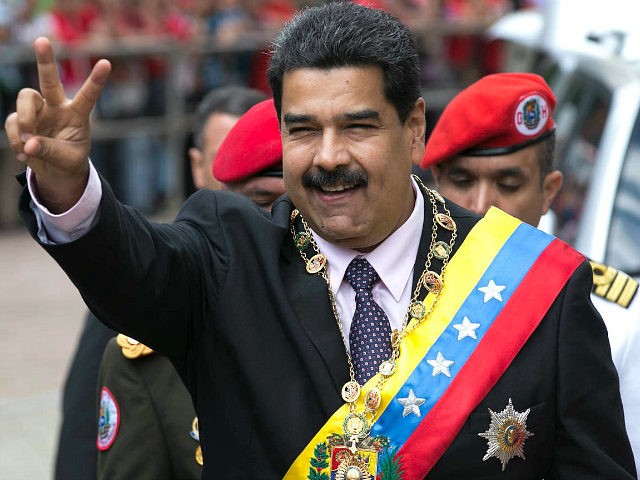As the death toll from weeks of protests in Venezuela continues to grow, dictator Nicolás Maduro has repeatedly placed emphasis in his television appearances on the importance of dance in society, decreeing on Wednesday that all socialists must know how to dance or immediately learn how.
“The revolutionary youth need to know how to sing, love, and dance to construct a revolution of peace and happiness,” said Maduro, flanked by high-ranking socialist officials. “We must all dance; whoever doesn’t know how to dance needs to learn.”
He particularly chided Vice President of Social Development Elías Jaua, who allegedly does not know how to dance, and made the officials on stage dance along with him.
This is the third time within the past week that Maduro took to the airwaves to dance. On Tuesday, Maduro appeared on a national television broadcast with a group of breakdancers and a hip-hop dance troupe, joining them for some improvised dance moves.
The broadcast was meant to announce the unveiling of the “Salsa and Urban Heart” educational initiative, in which the government is encouraging students – who make up a large percentage of the anti-socialist resistance – to abandon their protests and join dance troupes to “express our rebellion.”
“Where Chavismo is in the streets, there will be peace,” Maduro announced on television.
On television last Thursday, Maduro appeared at a performance honoring the salsa band El Gran Combo de Puerto Rico, dancing with Health Minister Luisana Melo.
Maduro has made music a cornerstone of his public persona, hosting a radio program titled Salsa Time in addition to his duties as the host of Sundays with Maduro, the heir to Hugo Chávez’s regular program Aló Presidente.
In contrast to the repeated references to dance on television, Maduro has made limited references to the protests engulfing the country. Maduro has repeatedly denounced a supposed conspiracy against his government organized by the United States, what he dubs the “economic war.” Recently, he referenced protests by making a homophobic joke about a student protester who approached the government’s armored tanks in the nude, holding only a Bible.
While the anti-socialist opposition has not relented in demanding a free and fair presidential election, protests have grown and become more violent in the past two weeks following an attempt by the Maduro-controlled Supreme Court to silence the opposition-led National Assembly.
The Supreme Court issued a ruling that decreed itself the nation’s lawmaking body, not the National Assembly, but walked the initiative back after a series of protests and pressure from the international community. Protests have persisted, however, in light of the continued imprisonment of prisoners of conscience, food rationing, and a near complete lack of medicine and basic goods.
Reuters reported on Thursday that 29 people have died in April so far amid protests, mostly students, some underaged, and including at least one elderly woman killed by tear gas in her home. The latest victims of police brutality during protests were three men aged 20, 22, and 28.
In response to unrest in Venezuela, the other member nations of the Organization of American States (OAS) have called for an emergency meeting to discuss intervention.
Maduro’s government responded to the meeting call by beginning proceedings to leave the OAS altogether, accusing the institution of following orders from the United States and meddling in its internal affairs. Had Venezuela not begun such procedures, the other member nations would have been able to invoke the OAS’s democratic charter to suspend Venezuela’s membership in the organization due to the dissolution of the democratic order in that state.

COMMENTS
Please let us know if you're having issues with commenting.